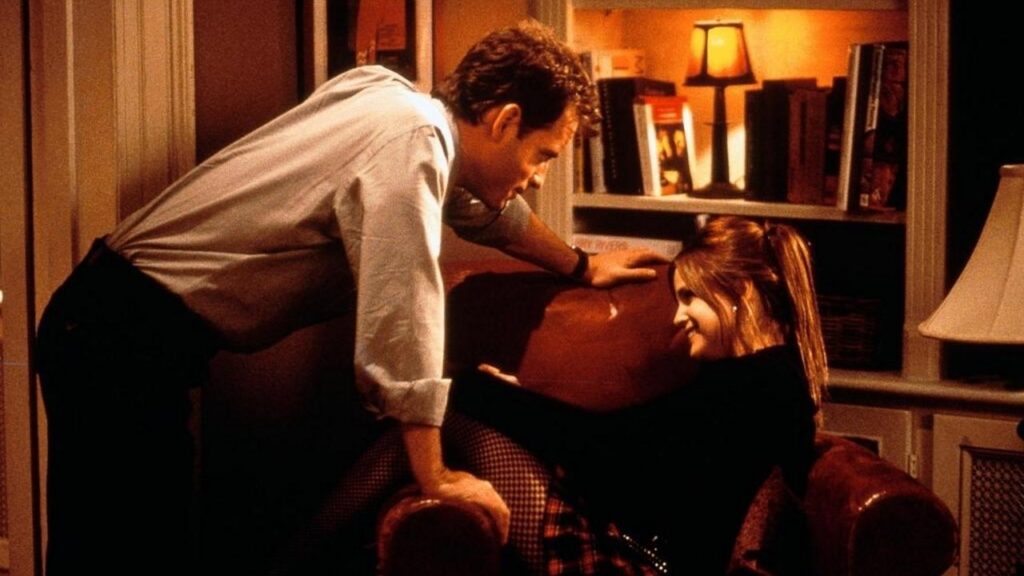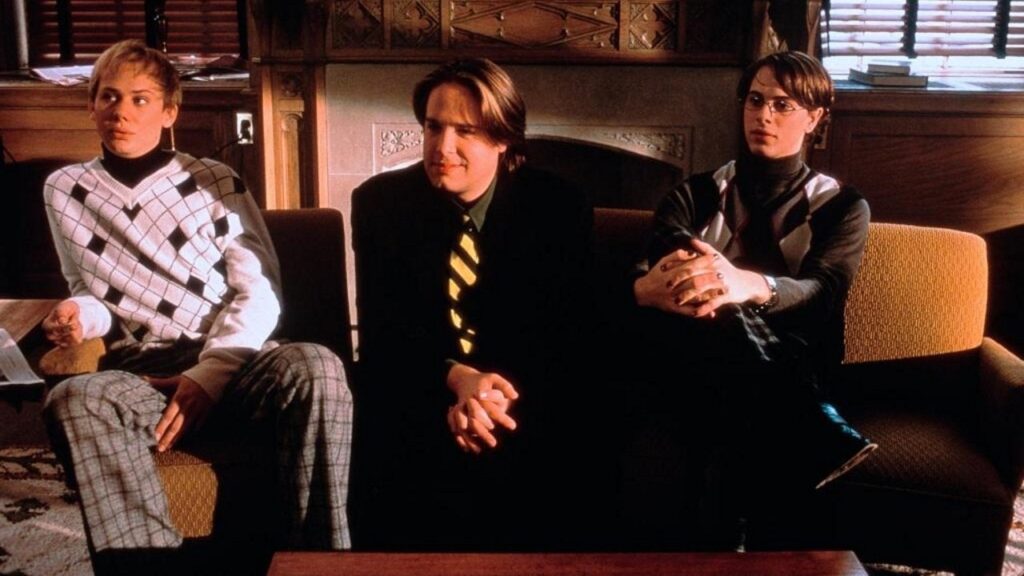Her name is Noelle / I have a dream about her
It’s always amusing when a song from a movie’s soundtrack ends up outliving the film itself. For example, Carly Rae Jepsen’s outstanding anthem “Cut to the Feeling” is a staple in gay bars and on Spotify playlists. Most people don’t remember it was written for the 2016 movie Ballerina. (Not the John Wick spinoff starring Ana de Armas. A French CGI cartoon with talking mice.)
Still, the afterlife of “Teenage Dirtbag” by Wheatus is something weirder and funnier than the usual case. The kitschy, dumpy pop-punk anthem about a loner with a crush on the hot girl with the jerk boyfriend might have faded away forever, except it was often misinterpreted as being sung from a girl’s point of view, thanks to Brendan B. Brown’s reedy, high tenor. That misread transformed a pretty rote rock radio whine into a kind of queer awakening anthem. The song’s been covered by tons of women vocalists since (Lizzy McAlpine’s wistful take is a personal favorite). Somewhere in the past two decades, this cringey, low-charting single graduated to classic rock status instead of vanishing. Wheatus is still riding that unlikely wave on the nostalgia festival circuit, long after the movie that launched the song disappeared in the rearview.
“Teenage Dirtbag” debuted as part of the soundtrack to Loser, a mostly forgotten teen romcom from 2000. It also showed up on Wheatus’s self-titled album about a month later, so the association between the movie and the song likely would have disappeared, except for one thing: The music video features Loser stars Jason Biggs and Mena Suvari, in character, pining for each other. Bizarrely, the video doesn’t use any footage from the movie and resets the action in a generic suburban high school instead of the film’s actual setting, a New York City college. But thanks to that clip, the song and the film are permanently linked in pop culture memory. Brown still wears wide-brimmed hats like the one from the video in concert. Scroll through the top reviews of the movie on Letterboxd and you’ll find half of them quoting the song’s chorus. In the movie itself, it’s just one number from a busy soundtrack, scoring an early montage.
Loser was written and directed by the great, underrated Amy Heckerling. She’s the writer-director of Clueless and, before that, director of the Cameron Crowe–penned Fast Times at Ridgemont High, two teen touchstones with wildly different flavors that still share a humanizing filmmaking voice. On TV she’s popped up all over, including a few episodes of the throwback charmer Red Oaks, which pulled in an all-star list of directors including Heckerling, Hal Hartley, Gregg Araki, and David Gordon Green. I was quite fond of the show. Heckerling’s superpower has always been tone management: finding the exact blend of sweet, sour, and side-eye so a scene plays both honest and funny with some strange touch.

Loser follows the first college semester of Paul Tannek (Jason Biggs), a painfully earnest Midwesterner who lands at a New York City college on scholarship and immediately face-plants into campus social life. His roommates, Chris (Tom Sadoski), Adam (Zak Orth), and Noah (Jimmi Simpson), decide he’s a hopeless dork and get him bounced from the dorms; he ends up crashing in the spare room of a veterinary hospital and working nights. Paul keeps crossing paths with the beautiful Dora Diamond (Mena Suvari), a classmate juggling a part-time job and a secret affair with their English professor, Edward Alcott (Greg Kinnear), who strings her along as he looks for a way to cleanly ditch her. One afternoon when he’s feeling particularly bold, Paul invites Dora to an Everclear concert; instead she’s lured to a party, coincidentally in his makeshift apartment. Here, her tenuous life balance falls apart.
(To the film’s credit, it leaves ambiguous who the titular “Loser” is. We initially assume Paul, but by the end of the runtime it could apply to any number of characters.)
Loser is a Heckerling joint through and through: a weird, specific cocktail of human warmth and gritty nastiness particularly reminiscent of Heckerling’s work on Fast Times. Released a year after American Pie reignited the teen sex comedy, it borrows some of that crude energy but keeps undercutting it with sharp character beats. The portraits have more shading than you might expect: Suvari’s Dora isn’t just a ditzy bombshell; she’s someone ground down by poverty and crappy men trying to exploit her. Biggs’s Paul isn’t a “nice guy” incel; he’s a big-hearted fish out of water trying to stay decent in a city that treats sincerity like a freshman blunder.

The middle act of Loser plays like an accidental remake of Billy Wilder’s The Apartment, filtered through a scuzzy college comedy. Paul’s spare room in the animal hospital becomes a makeshift party and hookup pad, hijacked by his former roommates to seduce women and throw ragers behind his back. At one such party, Dora gets slipped a double dose of roofies, called “ropes” here. (Again, the film doesn’t flinch from nastiness.) Paul finds her passed out and ends up caring for her while she recovers like they’re Jack Lemmon and Shirley MacLaine. Meanwhile, Professor Alcott, like Fred MacMurray’s corporate sleaze in The Apartment, keeps his distance until Dora’s feeling better, at which point he suddenly decides she’s welcome to move in after all. It’s a grim sequence, but one the movie handles without letting the comic tone or sense of compassion completely faceplant.
(And yet, the film’s most explicit homage is to The Graduate, not The Apartment. A late sequence recreates Dustin Hoffman’s Benjamin’s mopey sojourn at Berkeley, scored, of course, to “Scarborough Fair.” It’s an obvious, nearly shot-for-shot callback to a founding father of college melancholy.)
Loser’s cast is a good example of fit over star power. It’s not a lineup of headliners, but it is loaded with solid comedy character actors and oddball energy. Biggs and Suvari, both fresh off American Pie, bring a believable tenderness to their scenes together without ever dipping into sap. Jimmi Simpson, Zak Orth, and Tom Sadoski fully commit to being despicable frat boys, the kind who think “consent” is a brand of cologne. And Kinnear nails a very particular brand of professorial sleaze, smug and smiling and self-serving, without tipping into cartoon. Everyone plays their archetype just crooked enough to make it feel a little bit lived-in.

One of Loser’s loudest pleasures is its soundtrack (even beyond “Teenage Dirtbag”), which doesn’t so much needle-drop as needle-steamroll. In 2000 it probably felt like a label’s sampler platter shoved into a movie; twenty-five years on, it plays like a pristine Y2K time capsule. Music really is the closest thing we have to a time machine: Tal Bachman’s “She’s So High” sells a campus crush in three chords; Tom Sadoski’s hilarious dorm-room boogie to The Offspring’s “Pretty Fly (For a White Guy)” marks him as a dirtbag before he’s barely said a word; Everclear performs a concert central to the plot; and that’s just the tip of the iceberg. Elsewhere you catch snatches of Foo Fighters, Blink-182, and Bloodhound Gang, ghosts drawing you straight back to the late Clinton administration.
Not everything in the film works. For all of Heckerling’s magic touch, the tone wobbles a bit in a few scenes: sometimes leaning too cruel, sometimes too hackneyed or soft. The villainous roommates could’ve used even a single humanizing trait across the trio, or at least a slightly less single-track trajectory into full-on depravity. Late in the film, a pivotal emotional beat hinges on Paul Ask Jeeves-ing the side effects of an egg donation operation for Dora, which is a bit thin as a slice of kindness for Dora to see Paul with new eyes. And the movie’s closing montage, which offers a jokey rundown of each character’s fate, lands with a thud given how much the film had avoided that kind of broad-stroked cartoonishness. And the film can never quite shake its feeling of slack smallness and everyday stakes, which I view more as “quirk” than “flaw.”
Still, I find myself weirdly fond of Loser. I get why it was panned: It isn’t a crowd-pleaser or a laugh machine. No groundswell of nostalgia-heads have tried to reclaim it. It tanked at the box office and its aggregated scores on sites like Letterboxd and Rotten Tomatoes remain buried deep in the red. Loser is shaggy and uneven, but thanks to Heckerling (who also attended college in New York), it’s also got a heart where most films of its ilk would stuff some punchlines. This weird little dramedy is best remembered for a corny anthem about a social outcast in its soundtrack, which is a shame. I love it for exactly what it is.
Is It Good?
Good (5/8)
Dan is the founder and head critic of The Goods. Follow Dan on Letterboxd. Join the Discord for updates and discussion.


4 replies on “Loser (2000)”
I remember liking this, though it gets mixed up in my memory with Anything Else. Pretty sure the part where Woody Allen plausibly threatens to beat a guy to death with a tire iron is in Anything Else.
In 2021, I binged what felt like a ridiculous number of Allen films in chronological order, and still made it less than halfway through his filmography, so that’s one I haven’t seen. But whenever I look at his later films on Letterboxd or IMDb, my head always spins at the insane number of actors he’s worked with through the years. “Wait, he made a film starring Jason Biggs? One starring Leo? Uma Thurman? Multiple with Emma Stone? Joaquin Phoenix? Hugh Jackman?” And that doesn’t even include the ridiculous pulls from earlier in his career. He’s gotta have worked with the greatest cumulative cast of actors of any director ever.
I wonder how long it will be before the likes of Mr Jason Biggs get their shot at a character actor comeback? (He strikes me as a natural fit for any cast looking for a little comic dad-ness or earnestly square management types, especially as he gets older, even if that’s not really the stuff of Lead Roles).
Having not actually seen this film, the only other thing that I can add is my delight that Ms Suvari has a Zombie Movie in her acting credits: I’m quite surprised that she doesn’t seem to have many horror or urban fantasy credits in her CV, since she’s got the sort of Fairy Tale prettiness that works extremely well when you add fangs …
You know, I haven’t thought about the fact that I haven’t seen Biggs in much from the past 15 years, but I think you’re right that he’s got the chops to be a character actor. The David Krumholtz route (which, incidentally, it looks like they’re both playing roles in a movie called “Influenced” coming out later this year.)